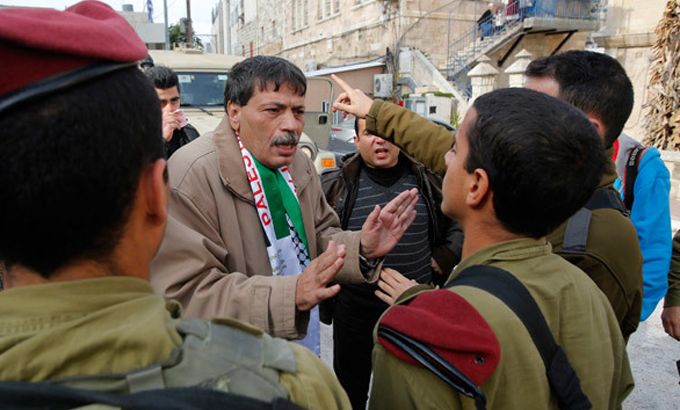Palestinians mourn slain minister
Thousands gather in occupied West Bank for funeral of minister Abu Ein, with Palestinians blaming Israel for his death.

Thousands of Palestinians have gathered to mourn a senior official who died in a confrontation with Israeli troops, as the army sent reinforcements to the occupied West Bank and braced for unrest.
Palestinian officials accused Israel of being responsible for the death of minister Ziad Abu Ein, who died shortly after an Israeli border policeman shoved and grabbed him by the throat during a protest north of Ramallah in the West Bank.
On Thursday, thousands of Palestinians gathered to mourn Abu Ein, whose body was laid to rest at El Bireh’s cemetery in the West Bank. A funeral procession, carrying the father of four, first made a stop at the Muqata – the presidential compound – for prayers.
Palestinian flags were flown at half-mast, and Quranic verses boomed from speakers, while people carried yellow Fatah banners and pictures of Abu Ein.
Palestinian President Mahmoud Abbas also took part in the prayer.
‘Assassination’ claims
Ehab Bseiso, a government spokesman, also said that the results of an autopsy carried out by a team of Palestinian, Jordanian and Israeli doctors showed Abu Ein did not die of natural causes.
“We hold Israel fully responsible for the murder of Abu Ein,” Bseiso said.
There was no Palestinian violence whatsoever, not even stone-throwing. Soldiers struck and tear-gassed him, and didn't allow us to evacuate him to the hospital fast enough
The Palestinian minister of health Jawad Awad said the autopsy, showed evidence of bruising in the neck, strikes to the face, and blockage in the coronary artery.
The Israeli authorities however, disputed those claims, saying the autopsy showed Abu Ein, also a senior Fatah official, had a pre-existing heart condition.
“The death of Ziad Abu Ein was caused by a blockage of the coronary artery [one of the arteries that supplies blood to the heart] due to haemorrhaging underneath a layer of atherosclerotic plaque. The bleeding could have been caused by stress,” a preliminary Israeli autopsy report said.
On Wednesday night, Abbas held a meeting with members of the PLO’s executive committee and Fatah officials, in which he said that “all options are open to discussion and implementation” to respond to Abu Ein’s death.
A follow-up meeting was to be held on Friday to discuss these options, which include heading to the International Criminal Court and joining more international bodies, chief Palestinian negotiator Sa’eb Erekat said.
“Netanyahu cannot continue to have a cost-free occupation,” Erekat said. “There are major steps to be taken, including to have the Israeli government resume its responsibilities as the full occupying power, which will include suspension of the security cooperation.”
On Wednesday, Abu Ein and a group of Palestinian and foreign activists were in Turmus Aya, a village northeast of Ramallah, planting olive tree saplings. The group was met with teargas and stun grenades, and Abu Ein was grabbed in the neck by a soldier. Shortly thereafter, he collapsed, clutching his chest. He died in a Ramallah hospital.
“There was no Palestinian violence whatsoever, not even stone-throwing,” said Amin Shoman, head of the higher committee for prisoners affairs, who was in Turmus ‘Aya with Abu Ein. “Soldiers struck and tear-gassed him, and didn’t allow us to evacuate him to the hospital fast enough,” Shoman claimed.
Joint probe proposed
On Wednesday night, Israel’s defence minister said a joint investigation with the Palestinian Authority (PA) was proposed.
“We express sorrow over his death,” Moshe Ya’alon said in a statement. “Security stability is important to both sides and we will continue coordination with the PA.”
Israeli Prime Minister Benjamin Netanyahu also sent a message – through his personal emissary, Isaac Molcho – saying it was important to “calm the situation and act responsibly”.
UN Secretary General Ban Ki-moon called on Israel to conduct a “prompt and transparent investigation” into the circumstances of Abu Ein’s death.
EU Foreign Minister Fedirica Mogherini said: “The information on the excessive use of force by Israeli security forces are of serious concern.”